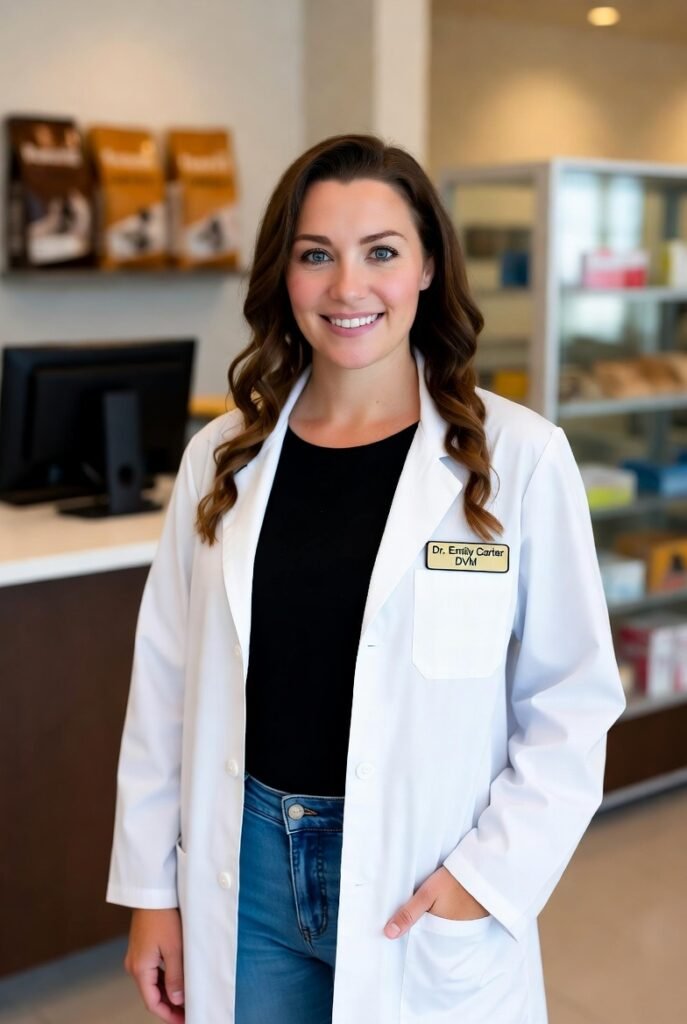The most dangerous foods for dogs are Xylitol (found in gum and peanut butter), Grapes/Raisins (which cause kidney failure), Chocolate, Onions, and Macadamia Nuts. If your dog ingests any of these, it is a medical emergency. Do not wait for symptoms—call your vet or Poison Control immediately.
Key Takeaways
-
The “Hidden” Killer: Xylitol is a sugar substitute found in “sugar-free” gum, peanut butter, and toothpaste. It kills faster than chocolate.
-
The “One Grape” Rule: There is no safe dose for grapes or raisins. Even one can shut down the kidneys of a 50lb dog.
-
Fat is Fatal: Bacon grease and ham trimmings can trigger Pancreatitis, a painful and potentially lethal inflammation.
-
Cooked Bones: Never feed cooked bones (chicken, steak). They splinter and puncture the stomach.
The Vet’s Take: Max’s “Grape” Escape
I wish I could say my own dog is perfect, but Max (my Beagle-Lab mix) is a dumpster on paws. Last Thanksgiving, I dropped a single grape on the kitchen floor. Before I could blink, he inhaled it.
I didn’t wait to see if he’d get sick. I rushed him to my clinic to induce vomiting. Why? because with grapes, you don’t gamble. I’ve seen dogs eat a whole bunch and be fine, and others eat three raisins and go into acute kidney failure.
In my practice, the saddest cases are the ones where the owner thought, “He looks fine, I’ll wait until morning.” By morning, the toxins have already done the damage. If in doubt, get it out.
The Science: Why Human Food Hurts
Dogs aren’t just “small humans.” They lack specific enzymes to break down compounds that are harmless to us.
-
Theobromine (Chocolate): Dogs metabolize this stimulant much slower than humans, leading to heart arrhythmias and seizures.
-
N-propyl disulfide (Onions): This compound attaches to a dog’s red blood cells and bursts them, causing life-threatening anemia.
-
Persin (Avocado): While the flesh is mostly okay, the skin and pit contain high levels of persin, causing vomiting and diarrhea.
The “Red Light” List: Highly Toxic Foods
1. Xylitol (Birch Sugar)
Risk Level: EXTREME Found in: Sugar-free gum, peanut butter, breath mints, toothpaste.
-
The Reaction: Causes a massive insulin spike within 10-60 minutes, leading to rapid hypoglycemia (low blood sugar), seizures, and liver failure.
-
Vet Tip: Always read the Peanut Butter label before stuffing a Kong.
2. Grapes & Raisins
Risk Level: EXTREME
-
The Reaction: Acute Kidney Failure. The exact toxin is still unknown, which makes it unpredictable and dangerous.
-
The Symptoms: Vomiting, lethargy, and stopping urination (anuria).
3. Chocolate & Caffeine
Risk Level: HIGH
-
The Rule: The darker the chocolate, the more dangerous it is. Baker’s chocolate is lethal; white chocolate is mostly fat (but still bad).
-
The Reaction: Hyperactivity, tremors, seizures, heart attack.
4. Onions, Garlic, & Chives
Risk Level: HIGH
-
The Form: Raw, cooked, and powdered (onion powder in chips/soup) are all toxic.
-
The Reaction: Oxidative damage to red blood cells (Heinz Body Anemia). Gums turn pale; dog becomes weak.
5. Macadamia Nuts
Risk Level: MODERATE
-
The Reaction: Causes a unique temporary paralysis. Dogs lose the ability to walk on their back legs, vomit, and get tremors. It usually resolves in 48 hours, but it’s terrifying to watch.
6. Alcohol
Risk Level: HIGH
-
The Reaction: Respiratory failure, coma, death. A small amount of beer can kill a small dog.
The “Yellow Light” List: Risky Foods
These might not kill them instantly, but they often cause expensive vet bills.
Cheat Sheet: “Can They Eat It?”
I keep this magnet on my fridge for pet sitters.
-
Can they eat Apples? ✅ Yes (No seeds/core).
-
Can they eat Bananas? ✅ Yes (In moderation).
-
Can they eat Almonds? ⚠️ No (Choking hazard/hard to digest).
-
Can they eat Ice Cream? ❌ No (Sugar/Lactose/Xylitol risk).
-
Can they eat Popcorn? ✅ Yes (If plain/air-popped).
Emergency Action Plan: “He ate it. Now what?”
Step 1: Stop the eating. Remove the dog from the area. Save the packaging (vets need to know ingredients).
Step 2: Check the clock. If ingestion happened less than 2 hours ago, we can often induce vomiting to get it out.
Step 3: Call the Pros.
-
ASPCA Poison Control: (888) 426-4435 (There is a fee, but it’s worth it).
-
Your Vet: Call immediately.
Step 4: Do NOT induce vomiting yourself unless told. Some toxins (like bleach or batteries) cause more damage coming back up. Never shove hydrogen peroxide down a throat without professional instruction.
Frequently Asked Questions
Q: My dog ate a chocolate chip cookie. Will he die? A: A single cookie usually contains very little cocoa. A 50lb dog will likely just have an upset stomach. A 5lb Yorkie might need treatment. Dark chocolate is the real killer.
Q: Why are cooked bones bad if wild dogs eat bones? A: Cooking changes the structure of the bone, drying it out and making it brittle. Raw bones are pliable and crunch; cooked bones shatter like glass.
Q: Is garlic good for fleas? A: NO. This is an old wives’ tale. The amount of garlic needed to repel fleas would be toxic to the dog. Stick to Simparica or NexGard.
About the Author: Dr. Emily Carter is a veterinarian who checks every ingredient label like a detective. Max, her dog, is banned from the kitchen when she is chopping onions, a rule he protests daily.
Disclaimer: This article is for educational purposes. If you suspect poisoning, time is tissue. Get to a vet immediately.
